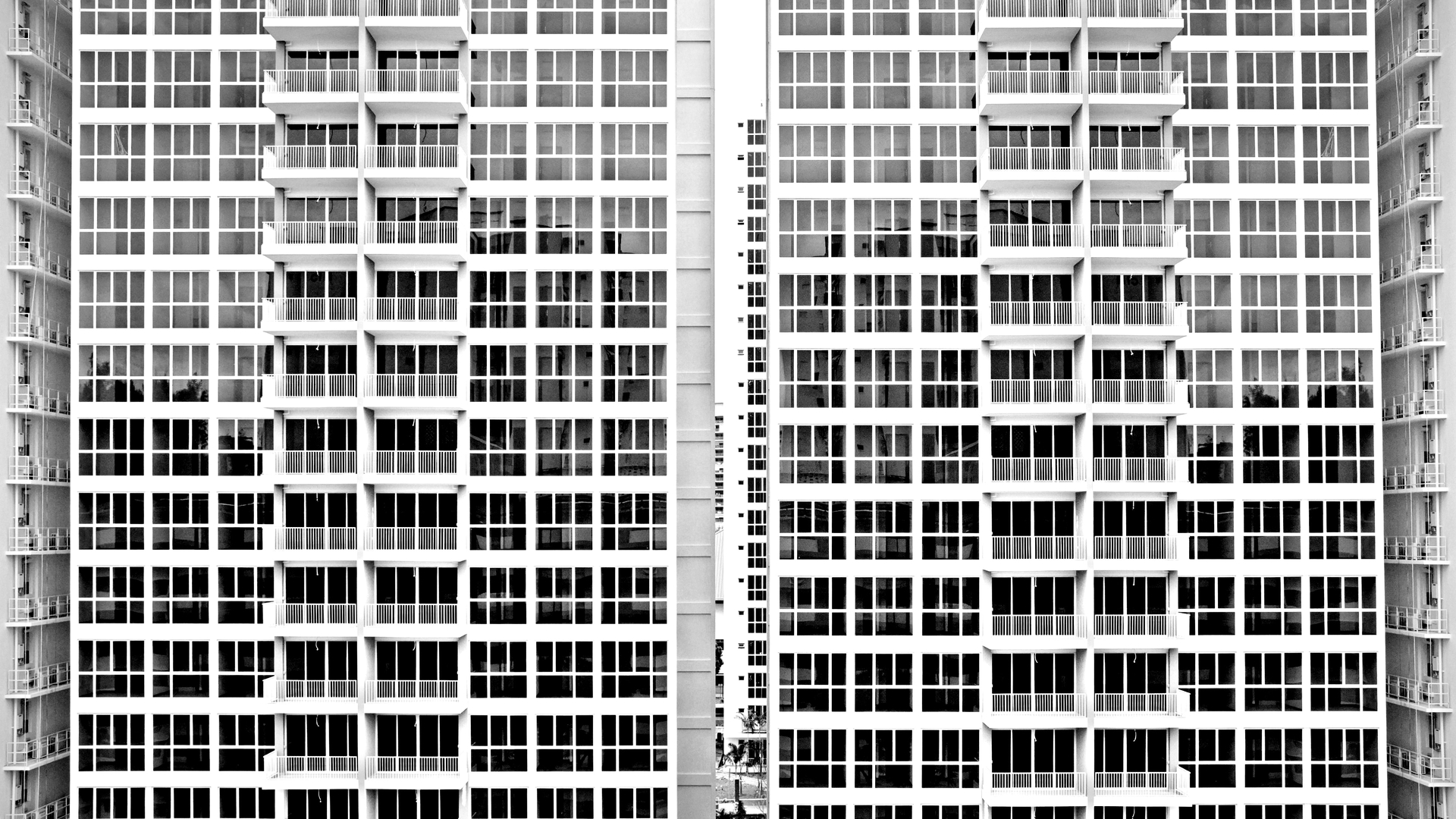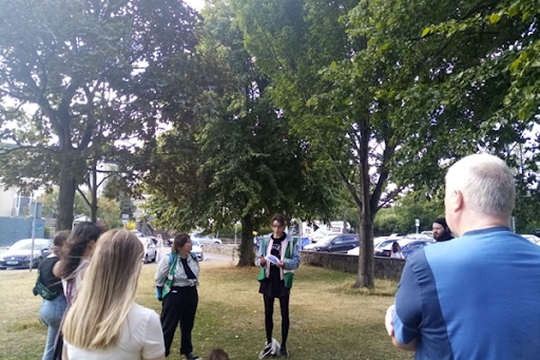Diary from Vulturilor 50
by
Erin McElroy,
Veda Popovici
October 9, 2019
Featured in Housing (#10)
Building a Radical Housing Justice Movement in Bucharest

inquiry
Diary from Vulturilor 50
Building a Radical Housing Justice Movement in Bucharest
On September 15th, 2014, dozens of military police crammed the narrow alleyway at Vulturilor 50 Street in Bucharest, Romania. Vulturilor 50 is an address in Bucharest’s city center, home to generations of Roma families who had been living there throughout the socialist and postsocialist eras. While this wasn’t the first time that the police showed up, it was this time that they would change the Vulturilor 50 space and community forever. The military police were in the process of evicting roughly 150 residents, displacing the tenants and all that they could carry.
Like most other evictions caused by restitutions—the mechanism in which property nationalized during socialism is returned to the descendants of pre-socialist owners—the eviction at Vulturilor 50 was resisted by the community that had been living there. Often this leads to eviction. Their opposition continued well after all of their belongings were thrown into the street, and the gate of the alley was sealed. That same September day, the evicted community decided to build an encampment on the street, protesting the eviction injustice. That collective decision marked the dawn of a two-year struggle that would alter the Bucharest housing justice landscape, consolidating the contemporary radical housing movement.
In what follows, we describe the context of restitution-induced eviction in Romania—a process that disproportionately dispossesses Roma communities. We also highlight the work of Frontul Comun pentru Dreptul la Locuire (The Common Front for the Right to Housing/FCDL), the Bucharest-based direct-action anti-eviction collective that we are members of. In particular, we elaborate upon the collaborative production of a manuscript project that FCDL and Vulturilor 50 members are in the midst of compiling, entitled How the Roma Are Fighting Back: A Diary and Guide for Resistance Against Restitutions and Forced Evictions. The book represents both a radical intervention in the politics of representation (of restitutions, protest and politicization) and a tool for further organizing and development of resistance tactics. We believe in this struggle not only because it has changed our lives, but also because we are attached to its principles of radical solidarity through community organizing.
Diary from Vulturilor 50
How the Roma Are Fighting Back, supported by the Antipode Foundation, articulates the struggle of the evicted community at Vulturilor 50 through the perspective of one of the community leaders, our colleague and FCDL member, Nicoleta Vișan. Central to the book is her diary, which highlights the longer resistance trajectory and strategies of the Vulturilor 50 tenants. In this way, her diary serves as an educational piece on political mobilization.
In addition to Nicoleta Vișan’s diary, How the Roma are Fighting Back includes an online resource with further analysis on the history of restitutive evictions. It also contains text narrating the position of the Vulturilor 50 in the context of the local and international housing justice struggles. As part of this project, we are also conducting a series of workshops in communities affected by restitutive evictions. Both the workshops and the textual volume are meant to be used as tools for solidarity and education in contexts of eviction, contributing and igniting politicization.
In the volume’s first pages, the reader encounters Nicoleta Vișan’s story about life in the camp, and about how the struggle further advanced. Her story is also the story of her FCDL colleagues, comrades who have supported her over the years and who learned from her about how to really do political work. The diary is more than a personal experience; first and foremost, it is a humbling story, and second, it is an inspirational tool that illuminates how to build a political struggle in the harshest conditions, and how to make it one’s own. It reveals how such a strategy can become a model for others, elsewhere.
Beginning with the violence of the 2014 eviction, Nicoleta’s account takes us through the everyday life in the two-year encampment, the community’s relationship with the local government and with groups of supporters and detractors alike. Stepping out of the camp, Nicoleta also walks us into the offices of higher-ranking government officials, and into the closed doors of the social housing departments in the City Hall. Anchored around the tale of the Vulturilor struggle, the diary brings us into the author’s life as a woman, as a mother, and as a Roma social worker on her path of becoming a political representative and organizer. A story of hope, community and solidarity, Nicoleta’s diary is also a first-hand account of violence, racism, dispossession, and marginalization. The experiences recounted here include many events, actions, and tactics taken upon by FCDL and other political groups in the housing movement.
About restitutions
Evictions in Romania are largely caused by the restructuring of the property regime following the end of state socialism in 1989. Exemplified by the privatization of the public housing stock, this restructuring valorizes private property.1 During socialism, a large percentage of property in Romania became nationalized and essentially became public housing. Through postsocialist capitalist reorganization, formerly nationalized housing has become reprivatized, and often restituted to the heirs and descendents of presocialist owners.2 This produces a strong anti-communist sentiment, one aligned with ongoing middle-class aspirational politics of “becoming” Western that have repeatedly manifested in Romania and Central and Eastern Europe following the collapse of state socialism.3
In Bucharest, restitutions are a constant cause for debate, whether it is for housing or public spaces being privatized. Significantly, one of the most common direct causes of evictions are restitutions; families and communities that had been allocated to live in these nationalized homes per socialist public housing programs, many of whom have been living in them for decades, are now being evicted without any real housing alternative. As such, housing ceases to be a right, and instead becomes a merit; only those who can prove that they can adapt to the new rules of capitalism are worthy of decent housing. Frequently attached to real estate interests, restitutions contribute significantly to the gentrification of many postsocialist cities.4
Evictions caused by restitution in Romania often target Roma communities, such as the community living at Vulturilor 50. While anti-Roma racism is nothing new in Romania or throughout Eastern and Western Europe for that matter, what is significant here is that Roma communities are bearing the brunt of postsocialist restitution practices. Roma were disproportionately subjected to racism prior to socialism due to a longer history of slavery, failed reparations, eugenics, and fascism. State socialism, in part, helped to ameliorate institutional racism by providing many Roma communities with nationalized housing. Restitution, as it allocates nationalized property back to the descendants of pre-socialist property regimes, therefore incites the racial dispossession of Roma families who have been living in formerly nationalized properties for generations—as was the case with Vulturilor 50.
Understanding restitutions as connected to the racist and unjust dispossession of worker neighbourhoods is central to the framing of Vulturilor 50 struggle. Yet this framing was importantly advanced several years earlier, by a community living in Bucharest’s Rahova-Uranus neighbourhood in 2006—another Roma-Romanian community unjustly evicted due to restitution. As the Rahova-Uranus community struggle revealed, restitutions and evictions are the first steps in transforming and gentrifying neighbourhoods, employed by real-estate developers in order to that extends the city centre at the expense of long term residents. In this context of “urban renewal,” workers and racialized Roma communities are expelled to the margins. Many other areas in Bucharest tell the same story: restitutions instigate forced evictions, constituting the first stage in a gentrification process in which an urban middle class comfortably installs itself, along with its lifestyle and “European” values, amidst what had been primarily working-class areas. Neighbourhoods such as Șerban Vodă, Zona Matache, Ferentari, Regina Maria, to name a few, have been going through similar processes.
Restitutions push former tenants—mostly workers—to the margins of the city. New owners largely sell the restituted property on the private market to very high prices, facilitating a gentrifying process. A material and symbolic victory of a new wealthy upper-middle class, restitutions are effectively a vertical redistribution of wealth.5 Framed in the broader processes of privatizations, restitutions are key to understanding how the displacement of workers have been put in place in postsocialism. Paired with massive layoffs and de-professionalization incited by the dismantlement of the industrial sector, restitutions have brutally struck the urban working class.6 Dispossession and dislocation go hand in hand, as most evictees move to the margins of the city and rural areas.7 Or, the evicted move abroad to work in Western Europe. Such material precaritization is legitimized through a region-wide anti-communist discourse that renders the working class as backwards, as uneducated, and even as former profiteers from socialist times.
Our struggle against evictions, forged through an antiracist cross-class alliance, has opened a field of engaged analysis. This collectively positions postsocialist neoliberal restructuring as the capitalist enclosure of non-private property. It also instigates the dispossession of the working class and the reinstitution of a historically legitimized upper-middle class. Our diary project is one of the many ways in which we are collaboratively putting forth this analysis, by documenting restitution’s racial and class-based effects from the ground up.
The Common Front for Housing Rights
Formed in 2013 by the collaborative initiative of evictees and supporters, the FCDL is a grassroots horizontal group with an anti-capitalist, antiracist agenda for housing justice. Organized around principles of community, autonomy, and member empowerment, the group engages in direct action, campaigning, research and community organizing. While seeking alliances with like-minded groups and organizations, the FCDL is anchored in broader anti-authoritarian and autonomous movements in Bucharest.
In addition to supporting communities undergoing evictions and confronting policy makers and politicians, the group engages in activist-based research. How the Roma are Fighting Back exemplifies some of this research and collaborative ethos. Vișan’s diary, edited through the lense of the collective commitment to the housing justice struggle, is supported by extensive research and contextualization. It also includes a set of concrete tools for resisting evictions and building solidarity with evictees. As a collaboratively produced work, the project reflects team labor dedicated to anchoring a critical perspective from concrete experiences of comrades.
In addition to Nicoleta’s diary, we include a guide on how to fight evictions, based upon our shared past experience and what we have learned from struggles such as Rahova-Uranus and Vulturilor 50. We also include a photo essay of the displacement struggle, being sure to not only include images of dispossession, but also resistance and endurance. This is important for us, as it refuses the more normative angles of “poverty porn” that we see so prevalent in journalism and academia alike. In the manuscript, we also include a link to a section of our website (forthcoming), that includes an online, interactive map of restitutions in Bucharest. This data was not easy to materialize, and we hope that by offering it to the public, we can help show how prevalent restitutions are. We can also detail which neighborhoods have been most impacted, and who the largest restitution beneficiaries are. This coming autumn, we will be releasing the map and book in a series of community-based workshops, again aiming for this material to be made accessible and useful to on-the-ground struggles against eviction. While How the Roma are Fighting Back incorporates the work and knowledge of countless people, this book project and its online contents are being led by Nicoleta Vișan, Carolina Vozian, Veda Popovici, Michele Lancione, Ioana Florea, Ioana Vlad, Iulia Mocanu, and Erin McElroy.
The FCDL is far from the only collective in Romania and throughout the region working to curb restitutive evictions and producing corollary materials. On the contrary, the FCDL works with several sister organizations in Romania under the banner of the grassroots coalition Block for Housing in Romania (Blocul la Locuire), which includes Social Housing Now (Căși Sociale Acum) based out of Cluj, the Renters Association of Cluj (Asociația Chiriașilor Cluj), and the Right to the City (Dreptul la Oraș) based out of Timișoara—both engaged in similar direct-action organizing, policy advocacy, and community-based research. It also includes E-Romnja, a feminist Roma rights organization, and RomaJust, a Roma-led legal advocacy group. By existing within this coalition, the work of the FCDL is able to support, and be supported by, ongoing nation-wide antiracist and housing justice organizing.
Based on the experiences and perspectives of militant communities such as Vulturilor 50, the Block is based on antiracist support of the working class, against the racialization of poverty and for the empowerment of women. The coalition’s directions of action are formulated according to anti-capitalist, antiracist, feminist, and communitarian values.
The FCDL is also actively part of the European Action Coalition for the Right to Housing and the City (EACRHC), a continental coalition of housing organizations working towards housing justice. In addition, we’ve been part of a series of research-based meetings for housing activist-scholars in Eastern Europe, where we collectively think about issues of restitutions, financialization, representation, and antiracist politics, to name a few. In this way, we seek for our activist-based research, including our forthcoming manuscript, to not only be based upon on-the-ground experiences and struggles, but also to inform ongoing regional and international antiracist, housing justice solidarity.
Regional and international alliances and fields of action remain an important direction of FCDL activities. These are key towards building a shared understanding of global capitalist dynamics as they affect material, social, and subjective lives. Working with the EACRHC helps us in allying against big landlords, real estate speculation, and neoliberal EU policies. Meanwhile, working with the Block abets our work of building a radical local movement against capitalism, racism, and housing injustice. In the Bucharest context, the FCDL’s efforts for community organizing and critical analysis have generated resources for further radical housing organizing. This helps politicize understandings of restitutions and property from a local, historical, antiracist, and anti-capitalist perspective. Our diary project is one of many ways in which we, as a collective, seek to explore the racial capitalist effects of postsocialist transition on housing, centering the perspectives of those impacted most. But also, by telling the story of Vulturilor 50’s resistance, and by including a guide on how to fight restitution induced evictions, we hope for our project and work to serve as a tool for others bearing the brunt of transition–locally and regionally.
About the Authors
Erin McElroy has been involved in housing justice organizing in the Bay Area and in Romania, working with activist groups and with the Anti-Eviction Mapping Project. Erin received a doctoral degree in Feminist Studies at the University of California Santa Cruz, and is now a postdoctoral researcher at New York University.
Veda Popovici works as a political artist, engaged theorist and local activist. Her political work develops on housing struggles and communitarian organizing as part of Macaz cooperative, the Common Front for Housing Rights and the Gazette of Political Art. After finishing her PhD on nationalism in Romanian art of the 1980s, she has taught classes on decolonial thought, nationalism and feminist theory at the National University of Arts in Bucharest and at the University of California Santa Cruz. She is based in Bucharest.
-
Ioana Florea and Mișa Dumitriu. 2017. Living on the edge: the ambiguities of squatting and urban development in Bucharest. In Freia Anders and Alexander Sedlmaier (Eds.) Public Goods versus Economic Interests. Global Perspectives on the History of Squatting (pp. 188–210). Routledge: London. ↩
-
Liviu Chelcea. 2019. After Engels: Evictions and the urbanization of anti-communism. Dialogues in Human Geography, 9(2) 205–215. https://doi.org/10.1177%2F2043820619850355; Ioana Florea. 2016. The ups and downs of a symbolic city: The architectural heritage protection movement in Bucharest. In Kerstin Jacobsson (Ed.) Urban grassroots movements in Central and Eastern Europe (pp. 55–78). Palgrave: London; Michele Lancione. 2017. The politics of embodied urban precarity: Roma people and the fight for housing in Bucharest, Romania. Geoforum, 101, 182–191. https://doi.org/10.1016/j.geoforum.2018.09.008 ↩
-
Neda Atanasoski and Erin McElroy. 2018. Postsocialism and the afterlives of revolution: impossible spaces of dissent. In Nicoletta Pireddu (Ed.) Reframing Critical, Literary, and Cultural Theories (pp. 273–297). Palgrave MacMillan: Cham; Crimethinc. 2017. The ‘Light Revolution’ in Romania: When Toppling the Government Isn’t Enough. Crimethinc, 9 March. https://crimethinc.com/2017/03/09/the-light-revolution-in-romania-when-toppling-the-government-isnt-enough; Adrian Deoancă. 2018. Class politics and Romania’s ‘White Revolution.’ Anthropology News, 58(4): 394–398. https://doi.org/10.1111/AN.502 ↩
-
Matthias Bernt. 2016. How post-socialist is gentrification? Observations in East Berlin and Saint Petersburg. Eurasian Geography and Economics, 57(4–5), 565–587. https://doi.org/10.1080/15387216.2016.1259079 ↩
-
Liviu Chelcea, Raluca Popescu, and Darie Cristea. 2015. Who are the gentrifiers and how do they change inner city neighborhoods. Geografie, 120(2), 113–133. https://www.geografie.cz/en/archive/download/68 ↩
-
Eniko Vincze. 2017. The ideology of economic liberalism and the politics of housing in Romania. Studia Universitatis Babes-Bolyai-Studia Europaea, 62(3), 29–54. https://doi.org/10.24193/subbeuropaea.2017.3.02 ↩
-
Erin McElroy. 2019. Digital nomads in siliconising Cluj: Material and allegorical double dispossession. Urban Studies. Online ahead of print. https://doi.org/10.1177%2F0042098019847448 ↩
Featured in Housing (#10)
Subscribe to Notes from Below
Subscribe now to Notes from Below, and get our print issues sent to your front door three times a year. For every subscriber, we’re also able to print a load of free copies to hand out in workplaces, neighbourhoods, prisons and picket lines. Can you subscribe now and support us in spreading Marxist ideas in the workplace?
Read next

Gimme A Home...
by
Chris Carlsson
/
Oct. 9, 2019

